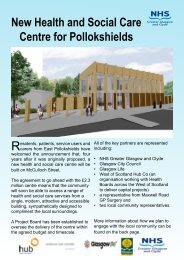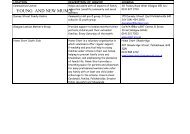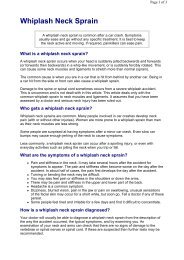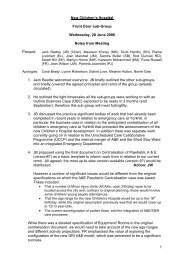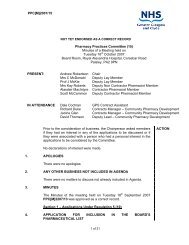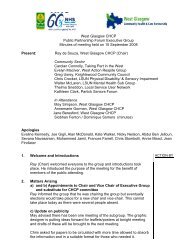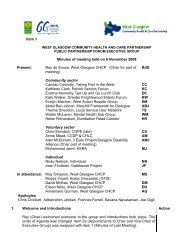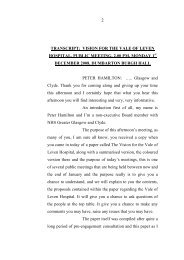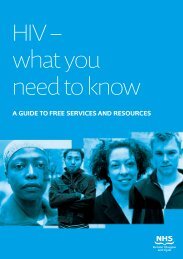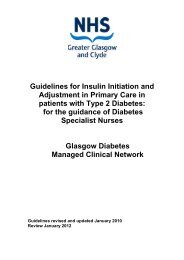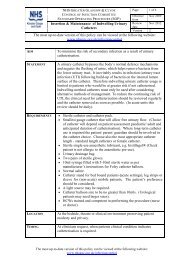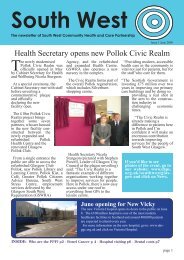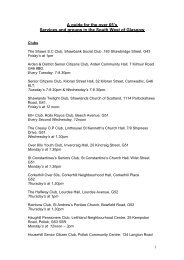Agenda for change - Terms and conditions handbook
Agenda for change - Terms and conditions handbook
Agenda for change - Terms and conditions handbook
Create successful ePaper yourself
Turn your PDF publications into a flip-book with our unique Google optimized e-Paper software.
Part 2: Pay Section 2: Working Outside Normal Hours<br />
__________________________________________________________________________<br />
decided on a prospective basis (e.g. <strong>for</strong> a <strong>for</strong>ward period of three<br />
months) based on the average work carried out during a prior<br />
reference period (e.g. of three months). Where these arrangements<br />
are agreed, the actual work carried out during a given period would be<br />
monitored <strong>and</strong>, if the average amount assumed in the calculation of the<br />
payment is significantly different, the level of payment should be<br />
adjusted <strong>for</strong> the next period; there should be no retrospective<br />
adjustment to the amount paid in the previous period.<br />
2.28 Where agreed locally, all current on-call arrangements may be<br />
protected <strong>for</strong> groups of employees <strong>for</strong> up to four years from the<br />
effective date of assimilation irrespective of whether they were<br />
nationally or locally agreed. This extended protection will apply to<br />
existing staff <strong>and</strong> new staff during the period of protection.<br />
2.29 On-call payments made under such arrangements should be<br />
excluded from the pre <strong>and</strong> post assimilation pay used in the calculation<br />
of any protected level of pay (see Section 46).<br />
Other Arrangements to Provide Extended Service Cover<br />
2.30 Some staff are required to be on the premises to provide emergency<br />
cover but are allowed to rest except <strong>for</strong> the times when they are<br />
required to carry out emergency work. Where employers consider this<br />
an essential arrangement to provide service cover, there should be an<br />
agreed local arrangement, at least equivalent to on-call payments, to<br />
recognise the type of cover provided.<br />
2.31 A further group of staff, often in community services such as learning<br />
disabilities, have “sleeping-in arrangements” where they sleep on work<br />
premises but are seldom required to attend an incident during the<br />
night. In these circumstances, appropriate arrangements should be<br />
agreed locally.<br />
Christmas <strong>and</strong> New Year Holidays at Weekends<br />
2.32 When public holidays during the Christmas <strong>and</strong> New Year period fall at<br />
weekends then alternate days will be designated as if they were paid<br />
public holidays <strong>and</strong> the appropriate payments applied.<br />
2.33 Where staff are required to work on what would otherwise have been a<br />
public holiday other than <strong>for</strong> the provisions in 2.32 above, then the<br />
appropriate agreements (see Annex D) relating to work on public<br />
holidays <strong>and</strong> weekends will apply to those days. However, staff will not<br />
receive additional payments <strong>for</strong> both the alternate days <strong>and</strong> the days<br />
which would otherwise have been public holidays.<br />
Transitional Arrangements<br />
2.34 See Section 46 <strong>for</strong> further in<strong>for</strong>mation on assimilation <strong>and</strong> protection.<br />
___________________________________________________________________________________<br />
<strong>Terms</strong> <strong>and</strong> Conditions of Service H<strong>and</strong>book



